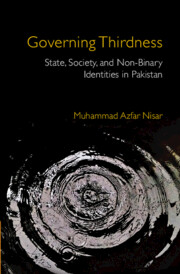Book contents
Part II - Legal Governance
Published online by Cambridge University Press: 10 December 2021
Summary
In considering many of the challenges that we face in matters of societal diversity, our inability to have an honest dialogue about how we develop our understanding of group construction and the impact of such construction on policy development keeps us on a road that prolongs ongoing challenges. (Farmbry 2009, viii)
An important way in which the state intersects with lives of marginalized individuals is by adjudicating or deciding on the legal definitions for various categories of individuals. The second half of twentieth century saw the rise of ‘politics of recognition’ (C. Taylor 1994) where marginalized groups tried to improve their social status by seeking formal legal recognition and protection of their identities. In contrast to the first half of the twentieth century, when redistributive justice was the predominant demand of marginalized groups, the primary demand of identity-based movements was recognition of their separate identity-based rights. These movements were based on the idea that by official recognition of their identity and associating rights with that identity, the problem of social marginalization will eventually disappear (McNay 2014). Examples of such recognition-based movements include, but are not limited to, the African American civil rights movement (Kluger 2011; Morris 1984); ethnic minorities’ movements for civil rights (Donato 1997; Rosales 1997); women's rights movements (Kerber 1980; Rhode 1991); gender queer groups’ struggle for recognition (Clendinen and Nagourney 2001; Smith 2008); and of individuals diagnosed with mental illnesses (Fleischer and Zames 2001; Scotch 1988).
However, the politics and consequences of recognition have been contested on multiple fronts in recent years because of persistent social exclusion and marginalization in society. First, Nancy Fraser (1997, 2000) and her colleagues (Fraser and Honneth 2003) have problematized the exclusive focus of identity-based movements on recognition by the state at the expense of redistributive demands. According to Fraser (1995, 2000), the rise of the politics of recognition combined with the fall of communism led to an increase in social injustice in certain societies since regressive economic policies were often not the primary focus of attention of the identity-based movements of marginalized groups. According to Fraser (1995, 2001), redistribution and recognition are equally important and distinct aspects of marginalization and social equity can be achieved only if both these categories of social injustice are addressed.
- Type
- Chapter
- Information
- Governing ThirdnessState, Society, and Non-Binary Identities in Pakistan, pp. 79 - 82Publisher: Cambridge University PressPrint publication year: 2022



